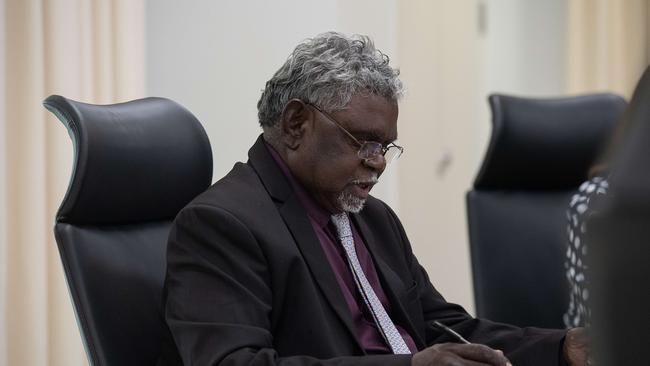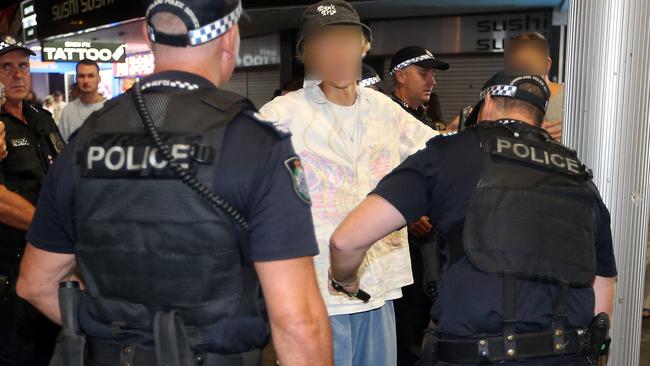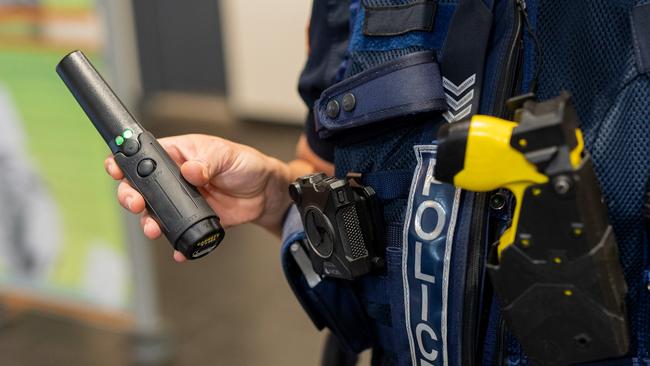Where NT Police will be able to do knife-detecting ‘wanding’
The government has passed new metal detector ‘wanding’ laws despite concerns it will disproportionately target Indigenous people. See a map of the 16 ‘high-risk’ areas police will target.
Northern Territory
Don't miss out on the headlines from Northern Territory. Followed categories will be added to My News.
Territory police have been granted the green light to “wand” people for knives and other weapons in 16 “high-risk” areas.
The government passed the Police Legislation Further Amendment Bill 2023 on urgency during Tuesday’s parliament sittings, which included changes to the Weapons Control Act 2001.
While the legislation was supported by both sides of politics, it did not pass without criticism.
Independent Araluen MLA Robyn Lambley voted in favour but voiced concerns it was being rushed into law and would lead to disproportionate scanning of Aboriginal people.

“Here we have another mechanism that will almost definitely racially profile Aboriginal people – that will be a big problem for this government,” she said.
“We have not heard them talk about it this afternoon but I am sure it will come up once the police get these wands.”
Ms Lambley said the government was passing the laws on urgency as it was under “extraordinary pressure” to act on crime, while also attempting to push past internal conflict.
“Why are we spending a whole day in parliament putting through legislation to be scanned when we are scanned all the time … what is so important about this legislation that it had to be put through today?” she said.
“The preciseness and detail in this legislation is because the members of the government cabinet are not happy with this idea.
“It does not sit with their view of the world – it makes them feel a little uncomfortable.
“This is a story not about enabling the police to use another strategy or implement to fight crime, but about a government which is in dire straits and in a whole world of trouble.”
Independent Mulka MLA Yingiya (Mark) Guyula did not support the Bill as he said it would lead to racial profiling.

“The government has announced additional risk areas … all areas frequently used by people who are long-grassing in Darwin,” he said.
“We know that First Nations people are targeted at bottle shops, making many people feel ashamed and uncomfortable that we have to explain ourselves every time we go somewhere, while others can continue to live their lives without harassment.”
Mr Guyula said the “escalation” of crime was not normal or acceptable and urged the government to act on bail support programs for youth with the same urgency.
“For crime occurring in remote communities, I believe that many decades of government policies, such as intervention, super shires, growth towns and ‘first four hours of English’ only have contributed to the breakdown of our communities,” he said.
“Our elders’ authority, our power, has been taken from us, and our young people have grown up during the period of great confusion where their leaders have been completely disempowered.”
The Territory’s 16 ‘high-risk’ areas revealed
The government on Tuesday also added 10 new “high-risk” areas to the existing list of six – Darwin, Casuarina, Palmerston, Katherine, Tennant Creek and Alice Springs central business districts.
The new declarations cover central areas in Karama, Parap, Fannie Bay, Bundilla Beach, Leanyer, Stuart Park, Marrara, Malak, Nightcliff foreshore and Nightcliff precinct.
The existing area in Alice Springs has been expanded to include Anzac Hill and Mercure Resort, while Palmerston’s zone has grown to include licenced venues at Gateway Shopping Centre.
Chief Minister Natasha Fyles said the new high-risk areas were chosen with the backing of police, who will also be able to ban offenders from these locations.
“In the high-risk areas police can issue banning notices … to a person if they cause alcohol-fuelled violence, are involved in a crime, display anti-social behaviour or refuse to leave the area,” she said.

Police will be able to use metal-detector wands in any of the high risk areas, on public transport or at bus stops once the laws are gazetted this week.
Ms Fyles said the legislation was modelled on Queensland laws and came with a “safeguard” requiring police to gain approval from a senior officer to use the wands.
“We’re not going to tolerate a situation whereby it comes normalised for people to carry knives on the streets,” she said.
“In Queensland we have seen both hundreds of knives and weapons confiscated but also a deterrent for people.”
The Police Commissioner can also declare another suspected area, such as an event site or somewhere where crime or anti-social behaviour has occurred, under the “high-risk” conditions for a period of 12 hours.

Opposition Leader Lia Finocchiaro said while the CLP would support the Bill, it came with “significant questions” and did not address Territorians’ calls for tighter bail laws.
“The police wanding laws do not allow the police to immediately wand people if they suspect they have a knife,” she said.
“This is a power that’s going to really be used in limited circumstances and requires authentication either by a police commander or the Police Commissioner himself.
“There are very high level controls that this government has put in place which will undoubtedly make it difficult for police on the frontline to be able to use it quickly.”
Despite her concerns, Ms Finocchiaro said the party would not put up any amendments to the Bill.
The legislation is expected to pass on Tuesday evening.
The CLP will also table a petition by Samara Laverty, the mother of Declan Laverty, who was fatally stabbed while working at a Darwin bottleshop in March.
Signed by more than 19,000 people, it calls for the government to create “Declan’s Law” – which Ms Laverty said should include tighter bail laws, more family liaison officers and police wanding.
Police to use metal-detecting ‘wands’ amid knife crime crackdown
Territory police will start using knife-detecting wands in public places while laws relating to weapons offences will be strengthened, the Territory government has announced.
However bail laws will remain as they are, with a four-month review into current legislation recommending no further changes.
Axes will also be added to the list of “controlled weapons” in the Weapons Control Act – meaning violent offences involving axes and machetes will trigger a presumption against bail.
The changes are set to be introduced to parliament and passed on urgency this week.
Mr Murphy said police wanding would operate in high-risk areas such as on buses and near bottle shops, pubs and other places where alcohol is consumed.
It comes after NT Police members visited Queensland to learn how the additional powers had helped officers across the border.

CLP’s Namatjira MLA Bill Yan said the opposition supported any legislation that granted police more powers, but hit out at government for not strengthening bail.
The reforms fall short of creating a presumption against bail for any offences involving a makeshift weapon like a rock or star picket, as called for by the Country Liberal Opposition.
They also go against calls to implement “Declan’s Law” which similarly proposed tighter bail laws to remand anyone charged with a weapon-related offence.
However acting Police Commissioner Michael Murphy said police currently had sufficient powers to deal with suspected weapons offences.
“If we suspect someone has an offensive weapon, we have the powers of search, seizure and destruction,” he said.

Chief Minister Natasha Fyles said the review — which was announced in the wake of the death of Darwin bottleshop employee Declan Laverty — involved experts across government, police and the Justice Department.
“What it has concluded is that the Northern Territory has one of the most comprehensive and widest-encompassing bail acts in the country,” she said.
“We have thorough, robust laws as it stands … this is about making sure people understand the laws and that they understand the thoroughness of them.
“But we will be making some changes following this review … to (expand) the definition of knife to include machete, this was something that was at the request of police to provide that absolute clarity.”
Unlawfully carrying a controlled weapon can carry a penalty of up to 12 months’ imprisonment, or 24 months if the offence occurs at night, however Mr Murphy said “the officer on the day” may choose to issue a caution or fine instead.
NT parliament urgently passed the bail reforms in March, just days after Mr Laverty’s alleged murder.
The government’s bail and weapons review was publicly released on Monday while a knife crime strategy is due to drop in August.




